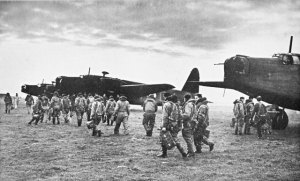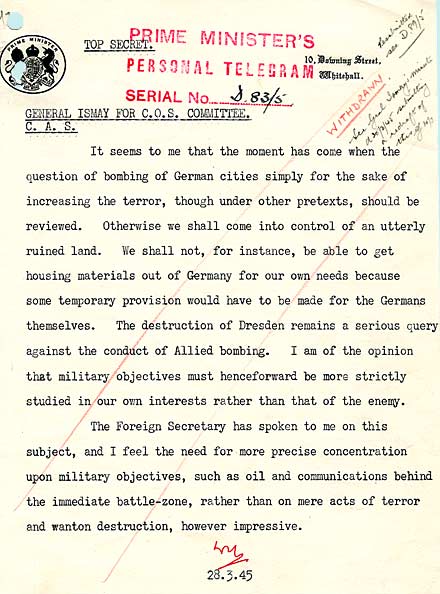A pilot gives a gives a glimpse into not only the chaos and confusion of battle, but the chatter and cooperation between crew members doing their best to get each other home:
“It was a moonlit night; we could even see the fingers of the docks. I said, “This is too good a chance to miss. Let’s get some of those barges. We’ll drop just one bomb at a time.” The bomb aimer went down to his bomb sight and lined up some of the barges. We were bombing from about 15,000 feet, and with a bit of “left, left, steady and right and steady”, I felt a little leap of the aeroplane and number one bomb went. I proceeded inland and did what was called a procedure turn: 45 degrees to one side for about a minute and a half and then a turn back and you come over your old track. On the way out we did “left, left, steady, steady, bomb gone”, and that was two bombs. There were 13 to go.
I began to notice in the perspex of the cockpit little flashes, like someone lighting a cigarette down behind me, and I asked the rear gunner, “Can you tell me what that light is behind us?” He said, “There’s some flak behind us, Captain, but it’s well behind us.”
We did three or four more runs and all the time these flashes were getting brighter and brighter and I was beginning to hear a crump each time. I became suspicious and said, “Jack, are you sure that flak is safe?”
He replied, “Oh yes, skipper it’s a good 25 yards off yet!”
On that run I said “Drop the lot”, and off we went back across the North Sea.
We were so inexperienced. I didn’t know what I was doing. I was sent the next night to Calais again as a punishment for being so stupid. This time the weather wasn’t so kind. From the English coast you could see underneath a layer of cloud the lights of Calais and the searchlights, but as you approached you came into the cloud and the target was hidden. I realised we weren’t going to be able to bomb visually and unless you could see the actual target you had to take your bombs back to base, which was a dangerous thing. I said to the crew, “We’re not going to be able to drop these on the barges at Calais. Let’s go home.”
I turned north, got the coffee thermos, and the smell of forbidden cigarettes began to waft up the fuselage from the back. I lost a bit of height and said to the navigator, “What time do you think we’ll reach the English coast?” With a tone of utter surprise, he said, “Have you left the French coast then?” “Yes,” I said, “I told you we were giving it up.” “How long ago was it?” he asked. I couldn’t imagine – half an hour, quarter of an hour. I told him 20 minutes. “Right,” he said, “we should be coming up to the coast in about 5 minutes’ time.”
I’d lost height from 15,000 down to about 8,000 feet by then and sure enough a coastline came up dark velvet against the silvery sea. I didn’t recognise the huge river mouth, with large islands. Panic hit me then, because we simply didn’t know where we were. It was certainly not England. I didn’t realise that in losing height the scale of everything had gone up and that the mouth of the river I saw looked like the Emden or the Rhine. The navigator came up to look at the coastline with me and as we came in over it to my horror guns started firing at us and searchlights waved around in front of us.
I turned out to sea to give a bit more thought to this. I asked to have any maps passed up to me and I looked at the coastline from Scotland to the Bay of Biscay trying to find this river mouth. We used to have an emergency frequency on the radio which was called “D for Darkie”, which you could call for help. I pressed the button and called “Hello Darkie, this is Lifebuoy A for Apple calling do you read?” A voice came back, “Allo, Lifebuoy A for Apple, zis eez….vill you land pleeze?” This proved they were hostile down there – there was no question of an RAF character talking like that!
We were utterly lost and in German territory. The end came when my gunner called, “Skipper! I think I can see a beacon.” There were networks of beacons flashing all over the country at night, and we had been given a code on a sheet to identify them. I set a course north from there and much to my pleasure our own home beacon came into view and we were able to land.
Now my Wing Commander was very unhappy about this whole procedure because he’d had to wait up for 6 hours unable to go to bed because he had a missing aircraft. He tore me off a strip. I said, “But sir, Darkie, I’m sure it was a teutonic accent.” “Yes,” he said, “there’s a Polish squadron down there!” So that explained that.'”
Wing Commander,
Rod Rodley DSO DFC AE
(Excerpted from the Bomber Command website)


